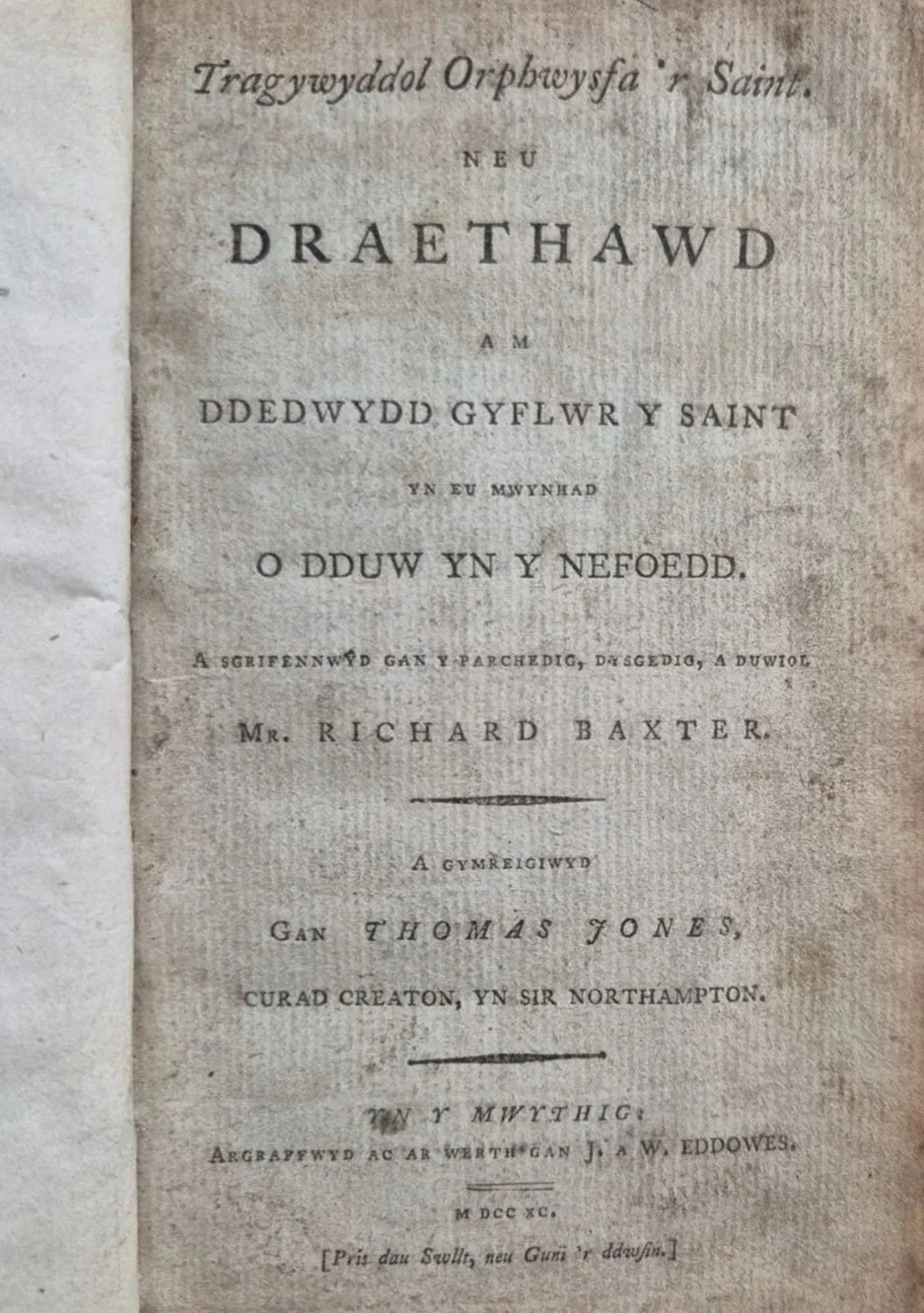 Image 1 of 1
Image 1 of 1


Tragywyddol Orphwysfa’r Saint neu Draethawd am Ddedwydd Gyflwr y Saint yn eu Mwynhad o Dduw yn y Nefoedd…
BAXTER, Richard; Thomas JONES [Trans.]
Tragywyddol Orphwysfa’r Saint neu Draethawd am Ddedwydd Gyflwr y Saint yn eu Mwynhad o Dduw yn y Nefoedd…
Printed and sold by J. a W. Eddowes, 1790
Small 8vo., contemporary calf, heavily worn and rubbed; pp. [iii], iv-xii, [i], 2-354; [iv], priced two shillings to the title;
[bound with]
ROMAINE, W[illiam]
Gwledd I’r Eglwys neu Ddeuddeg Pregeth, ar gan Salomon
Machynlleth: Titas Evans, 1792
Pp. [iii], iv-xiv, [i], 2-269, [i].
The binding rubbed with loss to the upper layer; split along spine with some small holes, binding string and cloth visible beneath, headband coming loose; holding, still; offsetting to endleaves; browning, spotting and finger marks throughout, with some corner and vertical creasing; some pen annotations throughout, mostly to the second part, comprised of capital ‘A’s to margins of title, p. 32-33 and verso of final leaf; p. 29-32 of second part trimmed at foot; a good, sound copy.
Two works in one, and the first translations into Welsh of these two titles.
The first book comprises Richard Baxter’s ‘The Saints’ Everlasting Rest’, here reading: ‘The Eternal Resting Place of the Saints, or an essay on the Happy Condition of the Saints in their Enjoyment of God in the Heavens’. It was one of Baxter’s major publications, written while he was recovering from illness, and remains a deeply comprehensive work of eschatology on the subject of life after death and the finer points of religion, with footnotes referring the reader to various passages from the Bible. The second work comprises twelve sermons by the Reverend W. Romaine.
Richard Baxter was an English clergyman from Shropshire who had a long and extensive career as a theologian. In 1662, following the Act of Uniformity, Baxter was one of 2000 clergymen who refused to take the oath, and was therefore expelled from the Church of England in what later became known as ‘the Great Ejection’. He thereby became an incredibly influential leader in the Nonconformist movement. William Romaine was ordained in 1734, and later became a pastor at St. Anne's, Blackfriars. Friends with William Grimshaw, Charles Wesley and George Whitefield, the present work takes as its focus the passages from the Song of Solomon, one of the most sexually explicit parts of the Bible.
Both of the volumes have been translated into Welsh by Thomas Jones (1752-1845), an evangelical preacher, writer of seven works in Welsh, and translator of numerous titles by such writers as Berridge and Sir Richard Hill, the last of which was published in 1841. He is perhaps best known today for his efforts to publish ten thousand copies of the Bible in Welsh, and it was partly due to this that the British and Foreign Bible Society was later established.
BAXTER, Richard; Thomas JONES [Trans.]
Tragywyddol Orphwysfa’r Saint neu Draethawd am Ddedwydd Gyflwr y Saint yn eu Mwynhad o Dduw yn y Nefoedd…
Printed and sold by J. a W. Eddowes, 1790
Small 8vo., contemporary calf, heavily worn and rubbed; pp. [iii], iv-xii, [i], 2-354; [iv], priced two shillings to the title;
[bound with]
ROMAINE, W[illiam]
Gwledd I’r Eglwys neu Ddeuddeg Pregeth, ar gan Salomon
Machynlleth: Titas Evans, 1792
Pp. [iii], iv-xiv, [i], 2-269, [i].
The binding rubbed with loss to the upper layer; split along spine with some small holes, binding string and cloth visible beneath, headband coming loose; holding, still; offsetting to endleaves; browning, spotting and finger marks throughout, with some corner and vertical creasing; some pen annotations throughout, mostly to the second part, comprised of capital ‘A’s to margins of title, p. 32-33 and verso of final leaf; p. 29-32 of second part trimmed at foot; a good, sound copy.
Two works in one, and the first translations into Welsh of these two titles.
The first book comprises Richard Baxter’s ‘The Saints’ Everlasting Rest’, here reading: ‘The Eternal Resting Place of the Saints, or an essay on the Happy Condition of the Saints in their Enjoyment of God in the Heavens’. It was one of Baxter’s major publications, written while he was recovering from illness, and remains a deeply comprehensive work of eschatology on the subject of life after death and the finer points of religion, with footnotes referring the reader to various passages from the Bible. The second work comprises twelve sermons by the Reverend W. Romaine.
Richard Baxter was an English clergyman from Shropshire who had a long and extensive career as a theologian. In 1662, following the Act of Uniformity, Baxter was one of 2000 clergymen who refused to take the oath, and was therefore expelled from the Church of England in what later became known as ‘the Great Ejection’. He thereby became an incredibly influential leader in the Nonconformist movement. William Romaine was ordained in 1734, and later became a pastor at St. Anne's, Blackfriars. Friends with William Grimshaw, Charles Wesley and George Whitefield, the present work takes as its focus the passages from the Song of Solomon, one of the most sexually explicit parts of the Bible.
Both of the volumes have been translated into Welsh by Thomas Jones (1752-1845), an evangelical preacher, writer of seven works in Welsh, and translator of numerous titles by such writers as Berridge and Sir Richard Hill, the last of which was published in 1841. He is perhaps best known today for his efforts to publish ten thousand copies of the Bible in Welsh, and it was partly due to this that the British and Foreign Bible Society was later established.

